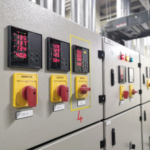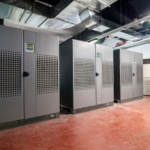Uninterruptible power supply systems have become increasingly common for business, home security and computing applications where losses of data due to power interruptions could cost thousands of dollars, compromised data or losses of long-term customers. UPS battery arrays can power anything from emergency lighting to full-service data centers. The best batteries for providing uninterrupted power offer reliability, longevity, safety, consistency and affordability.
UPS Battery Back-up Systems
UPS systems provide nearly instantaneous power when a service disruption could cause fatalities, injuries, data losses, inconvenience or costly disruptions of business. You can use a load calculator to determine how much power you need, and you can use serial and parallel configurations for generating higher voltage or higher current.
Finding the best battery for your needs depends on load characteristics, costs, maintenance requirements and self-discharge rates of the batteries. Most UPS systems use more than one cell, so your costs depend on how many batteries are needed and what kind of housing is required. Arranged serially, battery voltage increases. Parallel configurations increase current. Most systems use valve-regulated lead-acid batteries or sealed batteries because maintenance is minimal and costs are affordable. Although these batteries don’t require adding liquid, maintenance and testing is still important because excess heat and evaporation could reduce the charge and battery life.
Batteries for UPS systems fall into three categories: online, line-interactive and standby.
- Online
On-line UPS systems have inverters that convert DC power to AC power running during normal operation. Online systems deliver the highest level of protection for sensitive equipment. The system converts DC power into AC power. The system converts any unused AC power back to DC power to recharge the battery array. - Line-interactive
Line-interactive systems regulate or add power during low- or high-voltage events and short blackouts. These UPS systems protect against surges in power from AC outlets. Cheaper than an online system, this method provides good protection for a lower cost. - Standby
Standby systems are most commonly used for computers to protect from low- and high-voltage situations. The battery power comes online only when AC power fails. The inverter can operate the equipment for some time or allow enough time to save information, safely shut systems down or make alternative power arrangements.
Battery types for UPS systems
Types of UPS batteries include VRLA or sealed batteries and wet or flooded-cell batteries. These batteries are the best types for ensuring uninterruptible power because they require minimum maintenance, provide long-term protection for up to 20 years or cost less. VRLA batteries have shorter lifespans but require less maintenance. Wet-cell batteries last longer but require more maintenance more often. The battery handbook PDF download provides more detailed information about all types of batteries.
- Predictive maintenance and testing is essential for both types of batteries.
- You should clean, repair and replace components as needed.
- You should always use the same type and brand of battery to replace a worn cell, and best practices involve replacing the array as soon as possible if age is responsible for the failure.
- VRLA batteries require annual maintenance while wet-cell batteries need quarterly attention.
- Typical battery maintenance includes measuring and recording temperature, humidity and voltage readings.
- Adding distilled water to wet cells is essential for proper operation.
- Investigate conditions that could cause battery failure such as excessive cycling, lack of temperature control, poor charging and environmental contaminants.
Keeping detailed records of maintenance, installation dates and repairs will save money by documenting when replacements are needed. Regular inspections can spot abnormalities or environmental causes of corrosion and defects. Keep a record of the battery manufacturer’s recommended maintenance intervals and replacement times to ensure uninterrupted power in all situations.
Uninterruptible power supply systems depend on getting the right batteries, configuring them properly and maintaining them carefully. You might need to power your server for business, protect sensitive medications that depend on being stored at precise temperatures or run an entire building. During testing, the world’s largest UPS system, The Battery Electric Storage System in Fairbanks, Alaska, generated 46 megawatts of energy, which was enough power to run the city.
You might not have such aggressive demands as running a city, but your power needs could be just as important to you. Getting the right batteries for the job, keeping them maintained and replacing them before the charge weakens are essential for safety, security and reliability of any UPS system.






Hi Janine
I have a Valve regulated sealed lead acid battery. Does this fall into the category of “Sealed Batteries” you mentioned in this article?
Thank you.